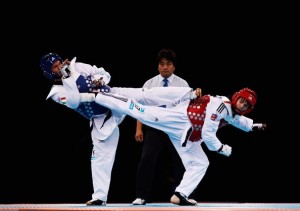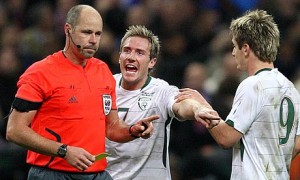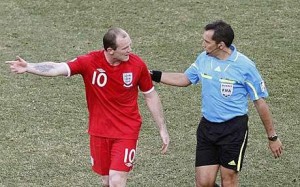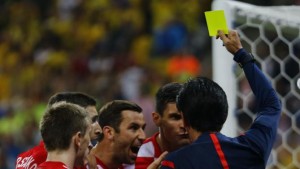Edited by Shiv Gidumal and Harrison Kalt
Referees are Humans
Football referees are the hard-workers on the pitch that, in general, have no fans rooting for them in the stadium. No matter how well they do, which calls they make, and where they’re from, they inevitably aggravate someone.
Sometimes, though rarely, his judgment coincides with the inclinations of the fans, but not even the does he emerge unscathed. The losers owe their loss to him and the winners triumph in spite of him. Scapegoat for every error, cause of every misfortune, the fans would have to invent him if he didn’t already exist. The more they hate him, the more they need him.
-Eduardo Galeano, Soccer in Sun and Shadow: The Referee [1]
On top of this, I bring earth-shattering news: referees are human beings! They make mistakes, which can sometimes have game-changing repercussions. They can’t see everything that happens, and may even hold some subconscious biases.
In a German study, Tae Kwon Do referees were analyzed for any subconscious affinities for the color of fighters. Forty-two referees each watched a video of a match between two fighters sporting different colored gear: red and blue. In the results from all referees, the fighter wearing red received an average of 13% more points. The referees then watched a second match, where the videos digitally switched the colors of the equipment. The match was exactly the same, but the player whose equipment was now red received more points than when he was blue, and the blue player received fewer points than when he was red [2].
While the study is more specific to referees in combat sports, it illustrates that referees will hold slight bias, even if they work extremely hard to achieve objectivity.
Specific World Cup Incidences
2010 World Cup
- Game type: World Cup Qualifier
- Referee: Martin Hansson
- Nationality: Swedish
- Game result: France win, 2-1
The Game: “Hand of Henry”
After 90 minutes of play, France and the Republic of Ireland were tied 1-1. When the game entered overtime, things got handsy.
French forward, Thierry Henry received a pass from teammate Sébastien Squillaci. Henry touches the ball twice, once to keep it in play and another to control it for a pass to William Gallas who scored the winner on Ireland [3].
Referee Martin Hansson and linesmen did not spot the handball in the crowded penalty area. Thus, the goal gave France a 2-1 win and qualification into the World Cup finals.
Ireland was furious. Head coach Richard Dunne criticized the referees stating that big teams like France always make it into the World Cup, “big teams get big decisions” [4].
Post-World Cup Career
After the match, the Football Association of Ireland (FAI) filed an official complaint with FIFA, stating “the blatantly incorrect decision by the referee to award the goal has damaged the integrity of the sport.” FAI demanded an invalidation of the match and a rematch with France. None of these requests were met [5].
To say that Hansson was heavily criticized for his decision would be an understatement. Despite the criticism, Hansson still gained selection for the World Cup in South Africa. A Swedish documentary was produced in 2010 about Hansson’s road to the 2010 World Cup in South Africa called Rättskiparen (English: The Referee).
Hansson had only one other controversial decision in the 2010 Champion’s League during a match between FC Porto and Arsenal. His decision to allow Porto players to take a quick indirect free kick deep inside the Arsenal penalty area was a controversial decision because Arsenal players were not in position at the time [6]. However, the Laws of the Game do not state that this has to be the case [7].
On October 8, 2013, Hansson official retired from refereeing. The 42-year old currently works with the Swedish emergency services and fire department. Regarding his decision to retire, Hansson made it clear that he doesn’t want his career to be determined by the outcome of a football match [8].
Slovenia vs. United States (2010)
- Game type: World Cup Group Stage
- Referee: Koman Coulibaly
- Nationality: Malian
- Game result: Draw, 2-2
The Game: “Phantom Foul”
With 5 minutes left in the match, Slovenia and the United States were tied 2-2. A free kick from Landon Donovan was headed into the goal by midfielder Maurice Ebu. Head referee Koman Coulibaly called a foul, waved off the goal, and offered none of the players or coaches an explanation [9].
Coulibaly isn’t new to controversies. In the 2006 World Cup qualifying match between Cameroon and Egypt, Coulibaly granted Cameroon and controversial stoppage-time penalty. The kick was missed, and Cameroon didn’t make it to the World Cup [10].
The Slovenia vs. United State game was Coulibaly’s only World Cup appearance. He was not chosen to officiate in the second round, and was sent home before the quarterfinals [11].
Later that year at the 2010 Champions League, Coulibaly was officiating a game between Al-Ahly and Ismaily SC. Coulibaly did not call a foul on an Al-Ahly player and had to be escorted off the pitch at the end of the game for his own protection from Ismaily players [12].
In 2011 at Club Africain vs. Al Hilal CAF Champions League match, Tunisian fans took over the pitch seven minutes into the game, forcing Coulibaly and his assistants to leave. Tunisians were fined $80,000 [13].
Coulibaly is still listed as a FIFA referee.
England vs. Germany (2010)
- Game type: World Cup Round of 16
- Referee: Jorge Larrionda
- Nationality: Uruguay
- Game result: Germany win, 4-1
The Game: Blind Refs
In the 39th minute of a close game, Germany held a 2-1 lead over England. In a great deal of excitement, English midfielder, Frank Lampard, drove the ball from just outside the penalty area into the goal to tie up the score.
Unfortunately, referee Jorge Larrionda and his linesmen did not call the goal valid and let the game proceed. Upon replay, it’s clear that the ball was well within the goal area after bouncing down from the top of the goal bar [14].
Many blame Larrionda’s error for destroying England’s hopes, and causing the game to spiral in Germany’s favor [15].
Larrionda has had a history of some controversial decisions, being dubbed “Red Card” Larrionda for his inclination for giving out red cards. He possessed the highest ratio of red cards per game in international football going into this match. Additionally, Larrionda mistakenly waved on a similar valid goal in 2005 in a World Cup Qualifying match between Brazil and Colombia [16].
Post-World Cup Career:
Unsurprisingly, Larrionda was sent home from the tournament after his controversial decision [17].
Despite these controversies, Larrionda gained esteem and respect after his stellar performance in the 2006 World Cup, even holding the honor of refereeing a semi-final game [16].
Larrionda retired from refereeing the following year in 2011 at age 43. He now serves as a member of the FIFA Referee Committee [18].
2014 World Cup
Brazil vs. Croatia (2014)
Game Type: World Cup Group Stage
Referee: Yuichi Nishimura
Nationality: Japanese
Game result: Brazil win, 3-1
The Game: “The Elbow”
In the 26th minute, Brazilian forward, superstar, and face of the 2014 World Cup Neymar deliberately elbowed Croatian midfielder Luka Modric.
Instead of sending Neymar off and leaving home-team Brazil with 10 men, Nishimura left Neymar with a yellow card.
Nishimura made several other decisions throughout the game that favored Brazil, including a penalty kick for Brazil following seemingly innocent contact between Croatian defender Dejan Lovren and Brazilian veteran Fred. Additionally, Nishimura controversially disallowed Ivica Olic’s equalizer for a supposed foul after Brazilian goalkeeper Júlio. This game set the precedent for the controversy-filled 2014 and immediately established the concerns for home team bias that fill every World Cup.
Moreover, Nishimura was criticized after Croatian defender Vedran Corluka suggested that Nishimura only spoke Japanese, although speaking English is a necessary requirement of FIFA referees.
Post-World Cup Career
Nishimura was appointed to two other games in the same tournament, but was relegated to the position of fourth official.
In the 2014 Asian Champions League, Nishimura earned even more scorn for his handling of the final. He denied Al-Hilal three penalty claims and could not handle the lasers being shone in players’ eyes.
Both the AFC and FIFA submitted criticisms of Nishimura.
Game Type: World Cup Group Stage
Referee: Marco Antonio Rodríguez
Nationality: Mexican
Game result: Uruguay win, 1-0
The Game: “The Bite”
This game sparked the most controversy of the entire 2014 World Cup. First, Italian Claudio Marchisio had a high challenge against Egidio Arévalo in the 59th minute. However, instead of calling a foul or issuing yellow card, Rodríguez questionably sent Marchisio off for the game with a red card.
Many commentators agreed that Rodríguez erred by sending off Marchisio for such a routine play. However, this was not even the most scandalous play of the match.
In the 79th minute, Luis Suarez and Giorgio Chiellini battled for position in the box. In replays, it is clear that Suarez lunges for Chiellini’s shoulder and forcefully bites him. Chiellini jerks backwards in reaction and both players fall to the ground. Afterwards, Suarez can be seen grabbing his teeth while Chiellini attempts to show the bitemarks on his shoulder to Rodriguez.
However, despite the Italian protests, Rodríguez chose not to penalize Suarez and, soon after, Diego Godín scored to give Uruguay their game-winning goal.
Post-World Cup Career
Later that day, FIFA announced that it would discipline Suarez, causing the media to call Rodríguez handling of the situation into question. Rodríguez had a reputation as a very strict referee who gave out many cards. He had controversially sent off Tim Cahill in a group stage match in 2010.
However, despite the fact that he sent off Marchisio and missed Suarez’s bite, FIFA supported him and even gave him the semifinal match between Germany and Brazil.
After the 2014 World Cup, Rodríguez retired after working three World Cups over a 25-year career.
Netherlands vs. Mexico (2014)
Game type: World Cup Round of 16
Referee: Pedro Proença
Nationality: Portugal
Game Result: Netherlands win 2-1
This Game: The Flop
Towards the end of the first half in the Round of 16 match between 2010 Finalists, the Netherlands, and Mexico, Dutch winger Arjen Robben was clipped in the box by defender Diego Reyes and midfielder Jesús Manuel Corona. Known widely for his reputation for diving,[19] Robben was not awarded a penalty, despite his best efforts to convince the referee that this innocent tap was indeed malicious. Nearly an hour later, with the score knotted at 1-1 during stoppage time, Robben went down in the box yet again. This time, it was Mexican captain Rafael Márquez, who just barely clipped the winger’s foot, sending the Dutchman into a series of skillfully executed and wildly convincing tumbles.[20]
While there was indeed a bit of contact, the circumstances surrounding the play -stoppage time during the round of 16 in the World Cup coupled with Robben’s deserved reputation for diving – made this call hugely controversial as it allowed Dutch striker, Klaas-Jan Huntelaar, to convert the game-winning goal and send Mexico home.
Incensed by the referee’s decision, fiery Mexican head coach, Miguel Herrera, was quoted saying, “Robben did three dives for penalties that didn’t exist. He had to be cautioned. If you do that to the guy who tries to cheat, then he can’t cheat again”.[21] After the match, Robben admitted to going to ground too easily during the game, going so far as to say that “[he] must apologize … I shouldn’t be doing that”[22]
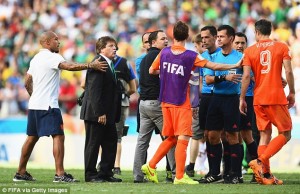
Post-World Cup Career
Known for his controversial style of refereeing – he has handed out a red card in 40 percent of the UEFA Champions League matches that he has officiated[23], nearly 27 percent more than the 13.5% average in the sport’s four biggest leagues (EPL, La Liga, Serie A and Bundelisga)[24] – Proença was not given another game by FIFA during the 2014 World Cup.
Back to World Cup Referee Blunders
References:
[1] Galeano, Eduardo. Soccer in Sun and Shadow. Basic, 2013. Print.
[2] Bakalar, Nicholas. Red’s the winner for tae kwon do referees. New York Times, 2008. http://www.nytimes.com/2008/08/17/sports/17iht-OLYTAE.1.15359242.html?_r=0
[3] Irish ‘cheated’ by Henry handball. BBC, 2009. http://news.bbc.co.uk/sport2/hi/football/internationals/8367420.stm
[4] Hytner, David; Lawrence, Amy. Ireland cheated out of World Cup by cruel hand of Thierry Henry. The Guardian, 2009. http://www.theguardian.com/football/2009/nov/19/ireland-thierry-henry-france-hand
[5] Football Association of Ireland calls for France result to be invalidated. The Guardian, 2009. http://www.theguardian.com/football/2009/nov/19/ireland-france-thierry-henry-world-cup
[6] Arsenal too fragile. L’Equipe.fr, 2010. http://www.lequipe.fr/Football/Actualites/Arsenal-trop-fragile/90501
[7] FIFA. Laws of the Game. Fédération Internationale de Football Association. Zurch, 2008. http://www.fifa.com/mm/document/affederation/federation/lotg_en_55753.pdf
[8] Henry handball referee quits football. ESPN, 2013. http://espnfc.com/news/story/_/id/1491814/henry-handball-referee-martin-hansson-quits-football?cc=5901
[9] Klein, Jeff. World Cup Live: Slovenia vs. United States. New York Times Soccer Blog, 2010. http://goal.blogs.nytimes.com/2010/06/18/world-cup-live-slovenia-vs-united-states/?_r=1
[10] Jimenez, Thomas. Soccer-Controversial Malian to referee Nations Cup final. Reuters, 2010. http://uk.reuters.com/article/2010/01/29/soccer-nations-referee-idUKLDE60S29O20100129
[11] Elser, Christopher. FIFA Sends Referees, Including Coulibaly, Larrionda, Home From World Cup. Bloomberg, 2010. http://www.bloomberg.com/news/2010-06-29/world-cup-referees-coulibaly-larrionda-sent-home-after-errors-in-matches.html
[12] Al Ahly vs El Ismaily Highlights. Nile Sports, 2010. http://nilesports.com/news/2010/08/02/video-al-ahly-vs-el-ismaily-highlights/
[13] Mohamed, Mahmoud. C. Africain-Al-Hilal clash called off after pitch invasion. Ahram Online, 2011. http://english.ahram.org.eg/NewsContent/6/54/11608/Sports/Africa/CAfricainAlHilal-clash-called-off-after-pitch-inva.aspx
[14] McCarra, Kevin. World Cup 2010: Germany tear down England’s defense. The Guardian, 2010. http://www.theguardian.com/football/2010/jun/27/germany-england-world-cup-2010
[15] McNulty, Phil. Germany 4-1 England. BBC, 2010. http://news.bbc.co.uk/sport2/hi/football/world_cup_2010/matches/match_51/default.stm
[16] White, Duncan. England v Germany: Jorge Larrionda has previous when it comes to line calls. The Telegraph, 2010. http://www.telegraph.co.uk/sport/football/teams/england/7857886/England-v-Germany-Jorge-Larrionda-has-previous-when-it-comes-to-line-calls.html
[17] Barlow, Matt. WORLD CUP 2010: Blunder referee Jorge Larrionda axed… bet he saw that one coming! Daily Mail Online, 2010. http://www.dailymail.co.uk/sport/worldcup2010/article-1290663/WORLD-CUP-2010-Blunder-referee-Jorge-Larrionda-axed.html
[18] Jorge Larrionda to retire. The Third Team, 2011. http://www.dailymail.co.uk/sport/football/article-2080016/Frank-Lampard-goal-referee-Jorge-Larrionda-retires.html
[19] Pickup, Oliver (30 June 2014). “Arjen Robben joins list of top 9 football divers of all time, but where does he rank compared to the others?”. The Telegraph Online (United Kingdom: Telegraph.co.uk). Retrieved 30 June 2014.
[20] Corder, Mike (29 June 2014). “Robben Falls Theatrically to Earn Decisive Penalty”. ABC News and Associated Press (USA: abcnews.go.com). Retrieved 29 June 2014.
[21] “Arjen Robben admits diving for a penalty… but not for the injury-time spot-kick that put Holland through to the quarter-finals”. Mike Dawes. Mail Online. Retrieved 29 June 2014.
[22] “Soccer-Robben confessed penalty unfair, says Mexico captain”
[23]http://365.worldsoccershop.com/news/european_news/general/19268/proenca_named_ref_for_euro_final
[24] Anderson, Chris. “Red Cards: How Common Are They?” Soccer by the Numbers (USA: 2012)

